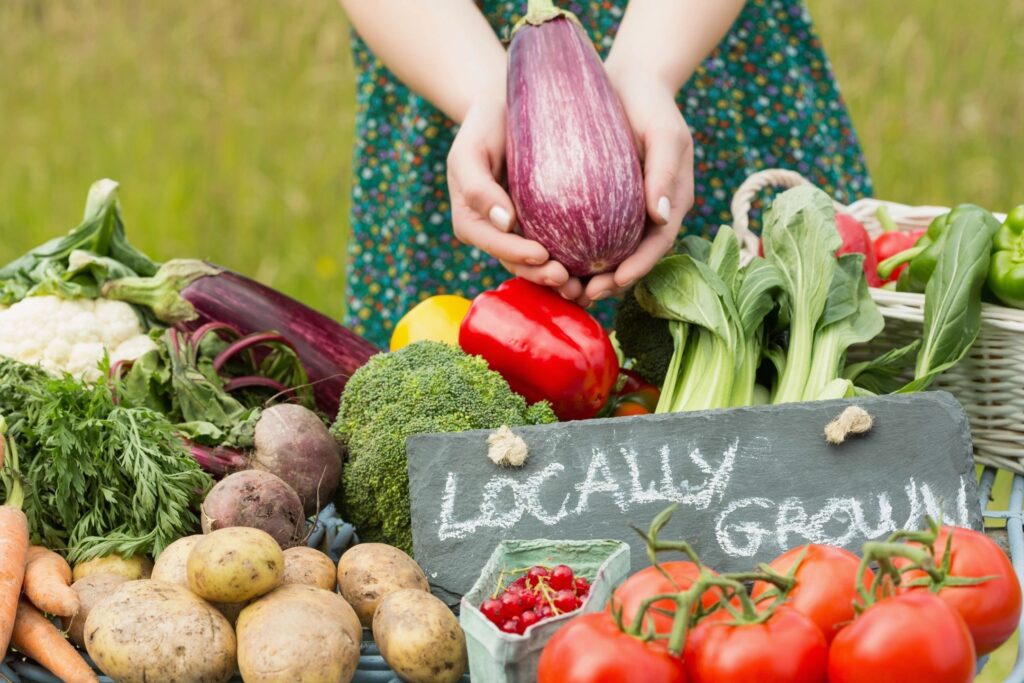Is It Safe to Have a Plant-Based Diet while Cycling?
An active lifestyle can really leave you with the munchies. Especially if that lifestyle involves cycling, you’ll have an appetite you’ve never known—which can actually lead to overeating—not matter how much you’ve trained.
However, most recently, most athletes have chosen to adopt a plant-based diet.
Following a plant-based diet means that you choose a food group that does not have animals in it. This type of diet means that eggs and dairy products such as cheese and milk are off the list. Instead, you can substitute with products such as almond milk.
Plant-based diets or vegan diets are lifestyle movements that are growing fast around the world. It is championed by athletes, celebrities and plant-loving chefs.
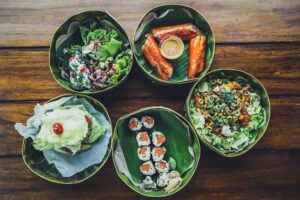
The vegan athletes featured in the Netflix Documentary, The Game Changers, show that a plant-based diet can be done successfully at a high level.
But is it safe for a cyclist to follow a vegan diet? This article will provide information on cycling and plant-based meals and how it can improve your performance.
Why A Plant-Based Diet?
In recent years, most people are starting to wonder whether they need meat and other animal products on their plates. In the UK alone, according to the Vegan Society, 1% of people now consider themselves as vegans and the number is rapidly increasing.
This is because there is great awareness of the potential health benefits of following a plant-based diet. There is also a better understanding of the issues related to animal welfare and the environment that comes with a plate of chips and meat and processed food. But can a cyclist live on a vegan diet lifestyle without compromising their performance? A cyclist’s optimal diet is one that has enough calories to maintain while on the road.
A cyclist’s diet is high in carbohydrates and protein—and are taken often in small amounts throughout a ride or throughout the day. The diet should be rich in minerals and vitamins to support the immune system. Hydration is also important.
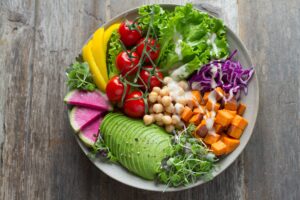
Our Guide to a Plant-Based Diet
Before going on a plant-based diet, keep in mind the following:
Do Your Research First
If you want to make a huge change in your diet to a plant-based diet, you need to do your research. Some people on the internet claim that they got sick after following a vegan diet. This is probably due to a lack of understanding and research on nutrition.
List all the foods that offer the nutrients that you need, try to consume them within one week, and note how you feel. This is a great starting step to follow.
Eat Enough
Well-known athletes that follow a vegan diet show that it can be possible to live on meat-free food. However, you need more than avocado on toast to obtain all the necessary nutrients for building and sustaining an athletic body.
Since plant-based diets depend heavily on nuts, plants, and seeds, they are often high in fiber. Fiber can help in improving digestive health and preventing heart disease, but the downside is that it doesn’t provide you with enough calories even if you eat a lot of veggies.
Eating enough is important—especially if you are a cyclist which is involved in heavy training sessions or long rides. This is to ensure that you have enough fuel. Include foods such as rice, pasta, and white and sweet potato since they are dense in calories.
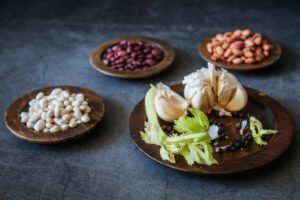
A plant-based diet that is poorly planned can be deficient and lacking in most important nutrients such as vitamin D, zinc, iron, calcium, Omega-3 fatty acids, and vitamin B12 since all these are readily available in animal products. Therefore, keeping an exercise and food diary is important to make sure that you have enough fuel to perform.
Complete Plant-Based Protein
Your muscles need to repair and your body needs to recover—especially after a long ride or hard training. To achieve this, your body needs amino acids, which are the building blocks of protein
Non-essential amino acids can be produced by the body but the essential amino acids need to come from supplementing or your diet. And if you are on a plant-based diet it can be difficult to find.
Also, branched-chained amino acids, which are under the essential amino acid category, are necessary for the repair and formation of muscles. However, it can be difficult to get these amino acids when you remove animal products from your diet.
Nuts, grains, and seeds are great sources of essential amino acids—but not all of them have branched-chained amino acids. However, chickpeas, lentils, peanuts, soya alternatives to yogurt and milk as well as soy-based products such as tofu do. Note that soy poses environmental and ethical dilemmas.
A classic combination of rice and beans will also provide a balance of essential amino acids.
The hardest part of a plant-based diet is protein consumption. You need to eat large amounts of plant-based food to meet the protein intake required for an athlete. Luckily, there are protein powders that are vegan friendly and readily available to help.
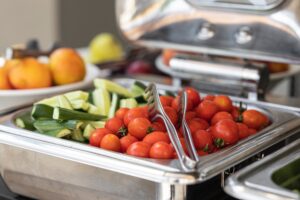
Iron
Foliate vegetables such as broccoli and spinach have high amounts of iron, so, there is no need for a cyclist following a plant-based diet to be deficient in iron. However, it can be difficult for the body to absorb the iron from plant-based sources.
Organic acids can help in the process. Having a glass of orange juice with your food or adding vinegar to your salad dressings are great solutions.
B12
Vitamin B12 is very vital for nerve function, recovering from cycling or training and for the development of red blood cells that transport oxygen. If you are following a vegan diet, consider supplementing this vitamin.
Fortunately, foods such as soya milk and breakfast cereals have fortified B12 and also most multi-vitamins have B12.
Creatine
Creatine is essential for explosive and sudden movements found in most sports. It can be found in pork, beef, and fish. For a plant-based cyclist, creatine helps in hypertrophic and strength phases of the training.
Studies have shown that the amount of creatine is low in the muscles of vegan athletes, therefore, if you are a vegan cyclist, consider supplementing it into your diet. Make sure to keep it at a low dosage of 5 grams per day since it can make you feel bloated.
However, you need to be careful as most creatine supplements are sourced from shellfish, so double check!
Essential Fatty Acids
It is recommended that all riders take supplements for fish oil to get the Omega 3 essential fatty acid. Omega 3 has several benefits relating to the health of a cyclist. They also have a specific impact on the rider’s performance and training.
The anti-inflammatory effects in Omega 3 essential fatty acid are beneficial after a rider is done with working out or cycling. Typically, a plant-based diet is low in Omega 3, therefore, vegan cyclists don’t necessarily need to take this supplement.
However, the ratio of Omega 3 with Omega 6 is important. Ensure that your intake of Omega 3 is increasing as your Omega 6 intake is lowering. To reduce the intake of Omega 6, do not cook food using vegetable, sunflower, corn and sesame oil. Instead use avocado, olive and peanut.
To raise your Omega 3 intake, add chia, flax and hemp seeds to your diet. Milled flax seeds are better. Algae-based Omega 3 supplements are also available and they designed specifically for vegans.
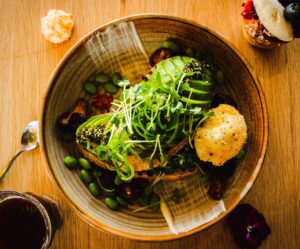 Processed Foods
Processed Foods
It is easy to find processed food that is also a vegan. However, you should always opt for whole, unprocessed foods. This is because most substitute foods are filled with bad fats and sugars which may not be good for your health.
An occasional treat is okay, but don’t make it a regular thing!
Vegan Cycling Day
The following is an example of a full day of vegan diet when cycling:
- Breakfast: quinoa porridge that is made with coconut milk, if you want it sweet add a banana and sprinkle some seeds and nuts.
- On the bike: good choices for the road include, dark chocolate, bananas, nuts and dried fruits. Peanut butter sandwiches and boiled sweet potatoes are also a good option.
- Recovery: when you get back home, make a smoothie using frozen berries, banana, soya milk with fortified B12 and ground flax seeds.
Five Must-Haves in a Plant-Based Cyclist Cupboard
The following foods are a must-have to ensure that you get the nutrients and protein that you need for your riding:
- Quinoa – A great source of protein, has 9 essential amino acids, B vitamins and minerals.
- Nut butter – They are a good source of useful fats, protein and minerals like selenium.
- Flaxseed oil – A great source of omega-3 and an alternative to fish oil.
- Tofu – It contains great amounts of iron and calcium.
- Virgin coconut oil – Use it for frying, as a spread or for cooking.
Final Thoughts
Cycling on a plant-based diet is great but like all diets, making the right choices and balancing nutrients is important. When following a plant-based diet, ensure that you eat enough food to fuel your riding.
The food that you consume should be filled with nutrients needed by your body, especially to speed up your recovery after riding. However, if you are not sure how to go about a vegan diet, ask your nutritionist or doctor for recommendations.

